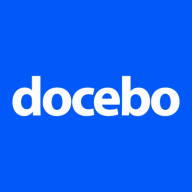

Moodle and Docebo are competing in the learning management system market. Moodle offers cost-effectiveness and customization, while Docebo stands out with advanced features and scalability, appealing to medium to large businesses.
Features: Moodle provides flexibility, extensive plugin support, and strong community assistance. It offers a wide range of learning tools tailored for diverse needs. Docebo includes AI-driven insights, mobile compatibility, and seamless integration, catering to organizations seeking advanced technology.
Ease of Deployment and Customer Service: Moodle supports on-premise installation, granting control over customization but requires technical expertise. Docebo's cloud-based model is easy to set up and has comprehensive support, ideal for organizations with limited technical resources.
Pricing and ROI: Moodle's lower setup cost is a benefit for budget-conscious organizations. Additional costs might arise for hosting and support. Docebo requires a higher initial investment, but its advanced features lead to greater long-term ROI through increased learner engagement.
| Company Size | Count |
|---|---|
| Small Business | 10 |
| Midsize Enterprise | 7 |
| Large Enterprise | 11 |
Docebo Learning Platform offers a versatile e-learning solution with features designed to enhance corporate training, making it a preferred choice for businesses aiming to streamline their learning processes.
Docebo Learning Platform stands out for its ability to integrate seamlessly into corporate environments, facilitating better learning experiences. Known for its adaptability and scalability, it effectively addresses the educational needs of enterprises by providing tools for content creation, distribution, and management. The platform supports a diverse range of learning styles, encouraging user engagement and participation. Its cloud-based design ensures accessibility and ease of use, making it a practical choice for global teams.
What features make Docebo Learning Platform attractive?Industries including technology, finance, and healthcare have implemented Docebo Learning Platform to streamline their training processes. Tech firms utilize it for onboarding and continuous education, while financial institutions focus on compliance and skill development. Healthcare sectors benefit from its ability to deliver up-to-date training on regulations and best practices. Its adaptability to different industry requirements ensures it meets specific training goals effectively.
Moodle provides open-source flexibility, plugin support, and integration capabilities for educational and organizational use, enhancing efficiency through features like course management and automatic grading.
Moodle is an adaptable platform for education and training purposes, offering extensive plugins, LTI tool compatibility, and integration options. Its course management, random exam question generation, and collaborative features make it popular among educational institutions. Modular design and activity modules strengthen user interaction, while accessibility measures support a diverse user base. Security and usability are key focuses, but improvements are needed in interface design and navigation. Scalability, customization, and documentation require attention for optimal performance and user satisfaction. Flexible integration with services like Google Suite and enhancements in reporting can further streamline its effectiveness.
What are Moodle's Key Features?In education, Moodle is commonly used for exam scheduling, course hosting, and assignment management. Corporations leverage it for training and certification needs, while educators use it for planning, quizzes, and interaction facilitation. Its ERP integration and plagiarism detection capabilities are utilized widely. Companies find its plugin and cloud support critical for customized training implementations.
We monitor all Learning Management Systems (LMS) reviews to prevent fraudulent reviews and keep review quality high. We do not post reviews by company employees or direct competitors. We validate each review for authenticity via cross-reference with LinkedIn, and personal follow-up with the reviewer when necessary.